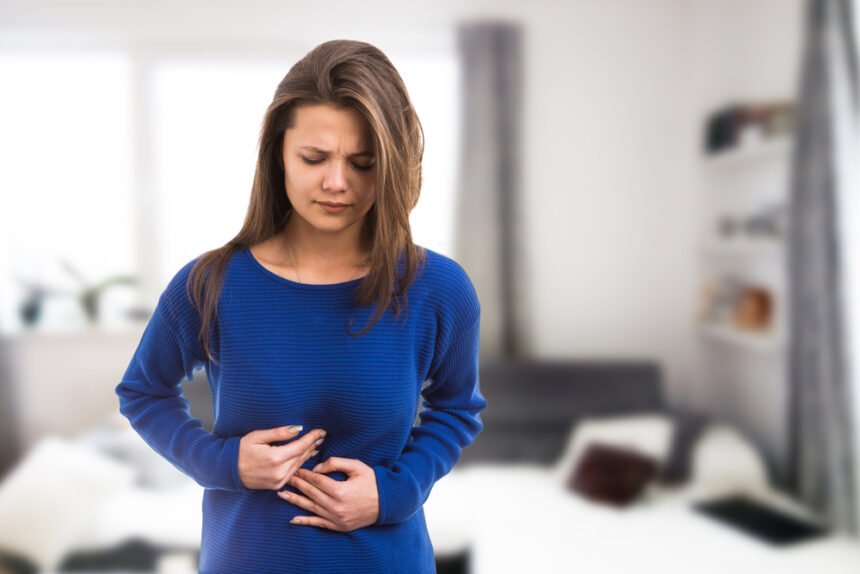Those with digestive problems all their lives know what a menace it is to live with bloating and gassiness. Did you know that over 40% of people worldwide suffer from digestive disorders? This piece of information has been deduced from findings conducted over time.
Another fact is that women are more prone to digestive disorders than men. I was going through
writing the other day that mentioned women are at 67% more risk of suffering from IBS (Irritable Bowel Syndrome) than men. The hormonal imbalances women go through not only during their monthly cycles but even in pregnancy and menopause take a toll on their digestive health.
Now, let’s focus on our topic of discussion. In this write-up, I will walk you through strategies to help you manage digestive discomfort in menopause. However, before I do that, I would also establish the link between digestive discomfort and menopause. But first, I would like to introduce myself.
This is Dr. Karen Pike. I am a board-certified ER doctor who actively worked in Northern California. While doing my duties as a doctor, I realized that most patients I was acquainted with weren’t aware of the basics of menopause. This prompted me to build up my website, Simply Menopause, to reach out to as many women as possible and increase their awareness. So, let’s get started.
How Does Menopause Affect Your Digestive System?
Most of the symptoms women experience in menopause are because of the fluctuating levels of estrogen and progesterone. The hormonal imbalance affects your digestive system as well, making you susceptible to abdominal pain, inconsistency in bowel movements, and abdominal pain. It even puts you at risk of several gastrointestinal disorders such as heartburn, acid reflux, IBS (Irritable bowel syndrome), etc. It could even trigger other symptoms like nausea and vomiting. However, in menopause, nausea will not just occur due to digestive issues. There is a significant connection between nausea and menopause, hormonal imbalance being one of the main reasons.
Let’s get into the details. Estrogen controls the intestinal muscles and helps the smooth passage of food through your digestive tract. Low estrogen levels cause food to move through the digestive tract slowly. If your digestion is prolonged, it leads to increased water reabsorption to the bloodstream. Under such circumstances, you could be at a greater risk of gassiness, bloating, and constipation. The low estrogen levels also impact the functioning of your gall bladder, making the bile more concentrated.
There is also a link between estrogen and pain. When there’s a dip in estrogen levels, it lowers your pain threshold. In this regard, I would also like to mention about the impact of the serotonin hormone on your body. Serotonin helps control pain and has other functions like maintaining bone health, aiding digestion, boosting mood, etc. Low estrogen causes a reduction in the serotonin levels. This makes you more susceptible to pain, which is why you could experience stomach and abdominal cramping even more when transitioning into menopause.
Essential Tips to Cope with Digestive Discomfort in Menopause
If you are in your mid-40s and constantly troubled with GERD, gassiness, acid reflux, heartburn, or any other issues, then there are certain things that you can do to relieve your pain and discomfort. Here are some essential tips for you to follow:
1. Eat In Small Amounts
I advise most patients who complain of digestive discomfort not to gulp a lot of food in a go. Instead, it would help if they ate small amounts at frequent intervals. When you do that, it gives your stomach ample time to digest the food well. It even helps your digestive system to function smoothly.
This is also one of the main advice most doctors give patients suffering from acid reflux. Large meals expand your stomach, preventing the complete closure of the sphincter. This causes the stomach content to travel up to the esophagus, triggering an acid reflux episode.
2. Increase Your Fiber Intake
Dietary fiber helps in digestion. Including sufficient amounts of insoluble fiber in your diet helps in the smooth passage of food through your intestines and stomach. Fiber also helps add bulk to your stool, making it easy to pass. Many women have even complained of constipation in the later years of their life. Fiber-rich foods will immensely help them to regularize their bowel movement. When talking about fiber-rich foods, the ones that top the list include:
- Avocado
- Pears
- Strawberries
- Oats
- Apples
- Carrots
- Bananas
- Broccoli
- Beet
- Brussels sprouts
- Artichoke
- Kale
- Tomato
- Spinach
- Lentil
- Split peas
- Kidney beans
- Quinoa
- Almonds
- Chia seeds
- Pumpkin seeds
- Sunflower seeds
- Pistachios
- Walnuts
- Sweet potatoes
- Fresh coconut
- Dried fruits
However, if you add fiber to your diet to improve your digestion, do it slowly and gradually. If you suddenly start consuming too much fiber, it could affect your digestive system, leading to abdominal cramping and bloating. Seeking a doctor’s advice regarding your fiber intake will help.
3. Exercise Well
When you exercise regularly, it boosts your overall health. Suppose I were to talk about digestion specifically. In that case, it is essential to mention that when you engage in a physical workout daily, it strengthens your digestive tract, helping in effective digestion.
Walking is one of the most appropriate exercises for better digestion. A study mentioned that walking after a meal facilitates digestion. It aids the food to move quickly in the digestive tract, lessening bloating, mainly for individuals with IBS.
Other cardio exercises like jogging, running, cycling, swimming, biking, etc. improve your digestion. When discussing exercises, I must mention yoga’s positive impact on the digestive system. Yoga helps to lessen stress, improve gut function, and increase circulation. When I was struggling to cope with IBS, my yoga instructor advised me to do a few poses, one of which was the seated side bend. It’s an excellent option for beginners looking for a gentle exercise to flex their muscles. Here is how I had to do it:
- Sit cross-legged on the floor with hands to the side.
- Lean to the right as you raise your left arm in the air.
- When you do this, your right arm should face outward and touch the floor.
- As you stay in this posture, inhale and exhale approximately four to five times.
- Change sides and repeat the same procedure.
4. Keep Your Stress Levels in Check
Stress is quite common in menopause since the increased occurrence of hot flashes and other symptoms make it challenging to keep your anxiety levels in control. Also, low estrogen levels elevate cortisol (stress hormones) levels, further triggering stress response. Increased stress isn’t good for your overall well-being and impacts your body functions, including digestion. If you are frequently stressed, your gut health is compromised, leading to digestive disorders.
That’s why managing your stress is essential always, and the need is even more in menopause when you already have a sensitive digestive system. You should understand the triggers and practice breathing and relaxation techniques to calm your mind. If managing your stress becomes troublesome, it is advisable to seek medical help.
Here are some other tips as well to follow for a better digestion:
- Stay hydrated. Drinking sufficient water and other healthy fluids in a day helps the food to break down effectively in your stomach, making it convenient for your body to absorb the essential nutrients.
- Avoid spicy foods, and also understand your triggers. If you feel bloated after eating certain foods like broccoli, kale, cheese, milk, etc, eliminate them from your diet. They may be healthy, but perhaps your digestive system can’t adjust to these foods well.
- Cut down on caffeinated beverages and alcohol, and stop smoking, as they could worsen your digestion.
- Chew slowly, as that helps your digestive system to break the food well, making you less susceptible to bloating, reflux, and other digestive disorders.
FAQs
Q. Does hormone therapy help with digestion?
Hormone replacement therapy helps manage several menopausal symptoms. You cannot deny its role in easing digestive discomfort as well. When you take the right kind of hormone therapy in the most appropriate dose, it will help you attain the benefits. You may talk to your doctor if you desire to opt for hormone therapy to manage your digestive issues.
Q. When should you consult the doctor regarding digestive problems in menopause?
If you have recurrent digestive issues accompanied by unexplained weight loss, inconsistent bowel movements, rectal bleeding, lessened appetite, increased nausea, and other digestive problems, a doctor’s consultation is needed. For instance, constant abdominal pain, teamed with abdominal fullness and recurrent bloating, may signify ovarian cancer.
Conclusion
You cannot do much about the hormonal imbalances. However, when you maintain a healthy diet, identify the triggers that make your digestion worse, and exercise well, you can improve your digestive health. Do not ignore the red flags, and contact your doctor when you notice any changes in your health that don’t seem normal.






